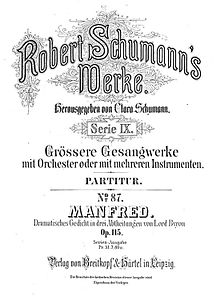Manfred (Schumann)

Manfred: Dramatic Poem with Music in Three Parts (Opus 115) (German: Manfred. Dramatisches Gedicht in drei Abtheilungen) is a work of incidental music by Robert Schumann. The work is based on the 1817 poem Manfred by Lord Byron and consists of an overture, and 15 pieces of music: an entracte, melodramas, and several solos and choruses.[1]
Written primarily in 1848, the overture was first performed at the Gewandhaus concert at Leipzig on 14 March 1852. The full work was then performed at the German National Theatre on 13 June 1852, with the orchestra conducted by Franz Liszt.[2]
The most highly regarded piece in the work is the Overture. Composer Hugo Wolf wrote that the work "has brought the essence, the focal point of the drama to plastic expression with the simplest strokes."[3] German-American psychiatrist and music historian Peter Ostwald wrote that the Overture was written during a time when Schumann was facing "exquisite suffering" from "inner voices," or auditory hallucinations.[4]
The overture's orchestration consists of 2 flutes, 2 oboes, 2 B-flat clarinets, 4 French horns, 3 trumpets, 3 trombones, timpani, and the string ensemble. It is in E-flat minor (but notated with only 3 flats on the score) and common time, and it follows the sonata form.
References
[edit]- ^ Tunbridge, Laura (2003). Schumann's Manfred in the mental theatre. Cambridge Opera Journal, 15: 153-183 doi:10.1017/S0954586703001678
- ^ Niecks, Frederick (1978). Robert Schumann. AMS Press, ISBN 978-0-404-13065-7
- ^ Daverio, John (1997). Robert Schumann: herald of a "new poetic age." Oxford University Press, ISBN 978-0-19-509180-9
- ^ Ostwald, Peter F. (1987). Schumann: The Inner Voices of a Musical Genius. UPNE, ISBN 978-1-55553-014-3
External links
[edit]- Manfred, Op.115 (Schumann, Robert) via IMSLP
